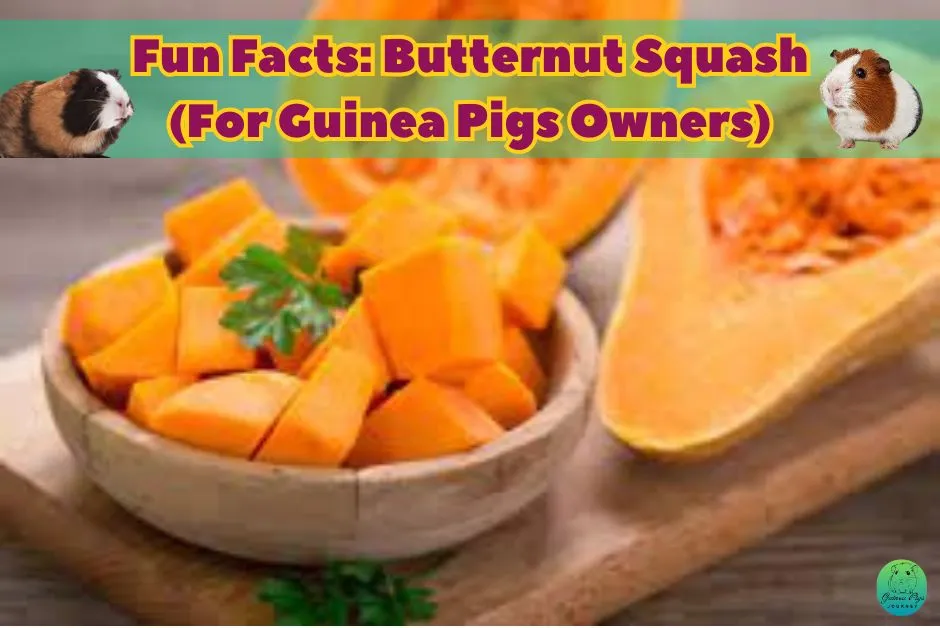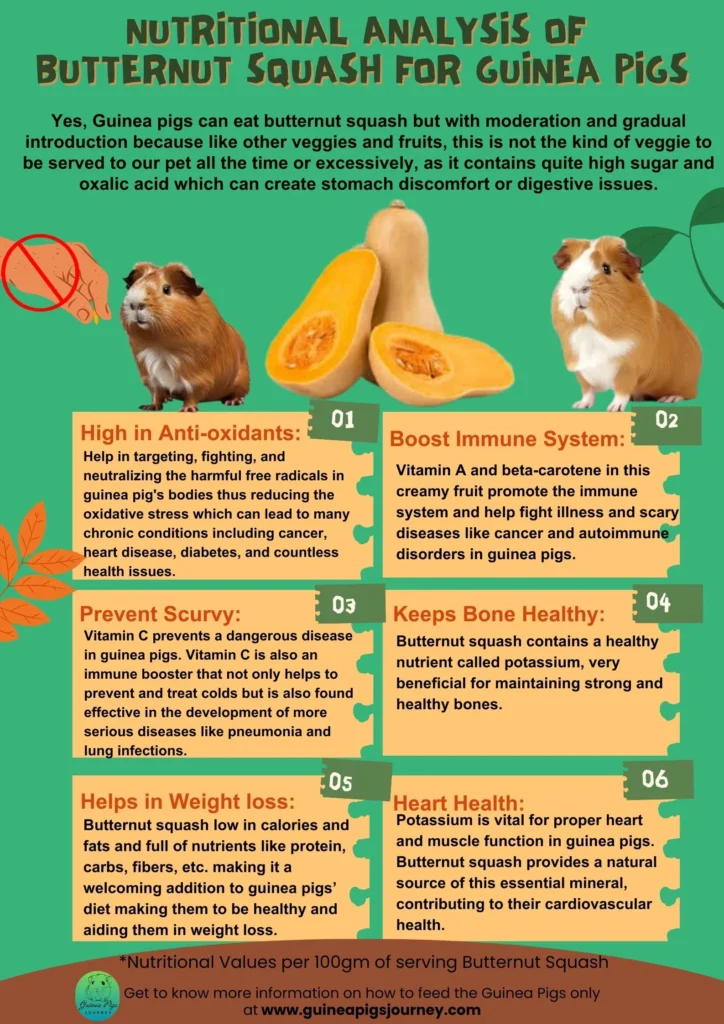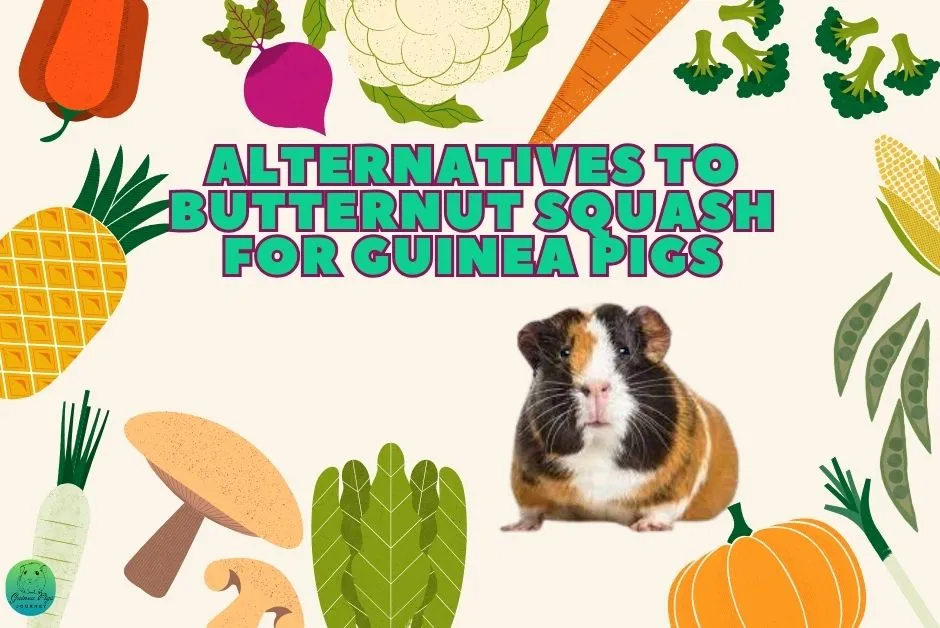When it comes to the dietary needs of sweet pocket pets like Guinea pigs, understanding their needs and feeding them all the delicious foods like zucchini, mustard greens, cilantro, etc. humans enjoy is paramount for responsible and caring ownership which is directly linked to the quality, quantity, and variety of foods guinea pigs consume. Nevertheless, numerous foods humans enjoy are not safe for guinea pigs. For this reason, one of the important questions arises:
Can guinea pigs eat butternut squash?
The Short answer is; Yes, Guinea pigs can eat butternut squash but with moderation and gradual introduction because like other veggies and fruits, this is not the kind of veggie to be served to our pet all the time or excessively, as it contains quite high sugar and oxalic acid which can create stomach discomfort or digestive issues. So, it is equally important for a guinea parent to know the frequency of serving and size along with the potential benefits and risk factors involved with excessive feeding of butternut squash for guinea pigs.
Butternut squash for guinea pigs can be a nutritious addition containing essential nutrients like vitamins A and C, dietary fiber, potassium, and minerals if fed in moderation. These contribute to the overall health of guinea pigs, supporting their immune system, maintaining healthy skin, and assisting digestion.
Understanding Guinea Pig Dietary Requirements:
Key Components of Their Diet: A guinea pig’s diet should consist primarily of High-quality Timothy hay as main staples, up to almost 10 % is supplemented by fresh vegetables and fruits with moderation, and a small number of high-quality pellets, and most importantly is clean fresh, filtered drinking water daily. Guinea pigs require almost 30-50 mg of Vitamin C daily as a primary nutrient for their good health as well as some other important nutrients like Vitamin A, Potassium, Phosphorus, Fibers, etc. for their overall health and well-being. Guinea pigs perform best with a diet containing low fats and low sugar.
Balancing and Varying Their Food Choices: Maintaining a balance in their diet ensures that guinea pigs receive a broad spectrum of nutrients. Varying their food choices not only prevents dullness but also addresses their nutritional needs broadly. Butternut squash for guinea pigs can be a part of the vegetable component if fed in moderation, providing variety and additional nutrients.
FUN FACTS – BUTTERNUT SQUASH (GUINEA PIG OWNER MUST KNOW)

- Butternut squash belongs to the family of fruits, Cucurbita. Especially known as one of the six varieties of Cucurbita moschata, you must know what type of species is good or bad for guinea pigs.
- Squash is commonly considered a vegetable; butternut squash is technically a fruit 😉
- In countries like New Zealand and Australia, this fruit is also known as butternut pumpkin or Gramma.
- Butternut squash is packed with a tasty punch of vitamins, minerals, fiber, and antioxidants for guinea pigs.
- Butternut squash is lower in calories and fats than other veggies but high in many nutrients, including vitamin A, vitamin C, magnesium, and potassium which will boost guinea pig’s overall health.
Nutritional Analysis of Butternut Squash for Guinea Pigs:
Butternut squash for Guinea pigs is a feast for the eye as well as a nutritional powerhouse containing a rich nutritional profile, boasting essential vitamins and minerals. For a healthy addition to guinea pigs’ diet, you must break down these nutrients and understand how they contribute to the overall health of guinea pigs. Listed below are the nutritional values and percentages per 100 grams to answer, Can pigs eat raw butternut squash?
| Nutrients | Value per 100 grams | DV % |
| Energy | 45 kcal | |
| Carbohydrates | 11.7 grams | 4 % |
| Water | 86.4 grams | |
| Fat | 0.1 gram | 0 % |
| Protein | 1 gram | 2 % |
| Dietary Fiber | 2 grams | 7 % |
| Vitamin C, total ascorbic acid | 21 mg | 23 % |
| Vitamin K | 1.1 µg | 1 % |
| Vitamin E | 1.44 mg | 10 % |
| Vitamin A, RAE | 532 µg | 59 % |
| Calories | 45 kcal | |
| Cholesterol | 0.00 mg | 0 % |
| Calcium, Ca | 48 mg | 4 % |
| Phosphorus, P | 33 mg | 3 % |
| Sugar | 2.2 grams | |
| Potassium, K | 352 mg | 7 % |
| Iron, Fe | 0.7 mg | 4 % |
| Magnesium, Mg | 34 mg | 8 % |
| Zinc, Zn | 0.15 mg | 1 % |
| Sodium, Na | 4 mg | 0 % |
| Ash | 0.8 grams | |
| Copper, Cu | 0.072 mg | 8 % |
| Folate | 27 µg | 7 % |
Note: * The % Daily Value (DV) indicates how much a nutrient in a serving of food is subsidized to a daily diet.

What Are The Nutritional Benefits of Butternut Squash for Guinea Pigs?
Butternut squash for guinea pigs, can be the nutritional powerhouse of essential vitamins, minerals, and antioxidants while being low in calories and sugar whereas high in fiber is a rich source to maintain a healthy life if fed as a treat in moderation. Here are some nutritional benefits of this tasty and nutty flavor butternut squash for guinea pigs.
High in Anti-oxidants: Butternut squash for guinea pigs is loaded with various high anti-oxidants, having a quality fat-soluble meaning that absorbed most efficiently in the bodies of guinea pigs that help in targeting, fighting, and neutralizing the harmful free radicals in guinea pigs bodies thus reducing the oxidative stress which can lead to many chronic conditions including cancer, heart disease, and diabetes and countless health issues. Butternut squash for guinea pigs is also a good source of Vitamin A containing incredible antioxidants beta-carotene, alpha-carotene, and beta-cryptoxanthin, which are linked to a reduction in inflammation and prevention of specific cancers.
Boost Immune System: Vitamin A and beta-carotene in this creamy fruit promote the immune system and help in fighting illness and scary diseases like cancer and autoimmune disorders in guinea pigs.
Prevent Scurvy: Butternut squash for guinea pigs also contains a good amount of Vitamin C, which is very important for guinea pigs, as they can not produce their own like humans. Vitamin C prevents a dangerous disease scurvy in guinea pigs. Vitamin C is also an immune booster that not only helps to prevent and treat colds but is also found effective in the development of more serious diseases like pneumonia and lung infections.
Keeps Bone Healthy: Butternut squash for guinea pigs contains a healthy nutrient called potassium, very beneficial for maintaining strong and healthy bones. The manganese found in butternut squash for guinea pigs is also important for bone growth, metabolic processes, maintaining the healthy skeletal system, and prevention of osteoporosis.
Helps in Weight loss: Butternut squash low in calories and fats and full of nutrients like protein, carbs, fibers, etc. making it a welcoming addition to guinea pigs’ diet making them to be healthy and aiding them in weight loss. One of the 2012 studies has also found that Cucurbita moschata (butternut squash) has a very effective anti-obesity quality. A low-fat diet is crucial for preventing obesity and related health issues in these guinea pigs.
Vitamins A and C: Butternut squash for guinea pigs is rich in vitamin A, essential for maintaining good vision, skin health, and a robust immune system in guinea pigs. Vitamin C, another crucial component, contributes to their overall health and aids in preventing scurvy, a condition common in guinea pigs.
Heart Health: Potassium is vital for proper heart and muscle function in guinea pigs. Butternut squash for guinea pigs provides a natural source of this essential mineral, contributing to their cardiovascular health. Potassium is an essential mineral that contributes to the regulation of blood pressure, Electrolyte Balance and maintaining a healthy cardiovascular system are crucial for the overall well-being
Healthy digestion: The dietary fiber in butternut squash for guinea pigs supports digestive health. It aids in maintaining a healthy gut, preventing constipation, and ensuring efficient nutrient absorption.
Skin and Coat Health: The combination of vitamin A and other nutrients in butternut squash for guinea pigs promotes healthy skin and a shiny coat. This not only enhances their physical appearance but also indicates overall well-being.
Potential Risks and Concerns of Butternut Squash for Guinea Pigs:
There are some potential risks and considerations you must look after while feeding butternut squash for guinea pigs. The most important to note is moderation is the key t feed to your cavies and the gradual introduction of any new food including butternut squash is very important to gain most of the benefits out of any food.
Sugar Content: Although like other fruits and veggies, butternut squash is not that much sugary, and low in fats still must be cautious about a feed of butternut squash to guinea pigs, as less amount of sugar content may also add weight gain and obesity along with other sugar content foods if not consumed with moderation. So, feed with moderation and save your guinea pigs from obesity and weight loss even leading to diabetes and digestive issues.
Digestive Upset: Introducing too quickly and not following the rule of gradual introduction can cause digestive discomfort in Guinea pigs. Guinea pigs are sensitive to digestive health to any sudden dietary change, leading to issues such as diarrhea or stomach discomfort.
Choking Hazards: Seeds of butternut squash for guinea pigs may create choking hazards and may cause digestive blockage and bloating if consumed. Always remember to remove seeds before offering butternut squash to guinea pigs.
Pesticides and Chemicals: All fruits and veggies including butternut squash must be washed before offering to guinea pigs, as they may be exposed to harmful chemicals, pesticides, and dirt while harvesting and in stores that may cause digestive issues in guinea pigs.
Potential Allergic Reactions: Some Guinea pigs may develop allergies to certain foods, including butternut squash. Signs of allergies may include skin irritations, swelling, difficulty breathing, hives, itching, or changes in behavior. It’s essential to observe guinea pigs closely when introducing new foods. Consult your veterinarian immediately.
Urinary Tract Issues: While the butternut squash for guinea pigs is not extremely high in calcium, it’s important to consider the overall calcium-phosphorus balance in the guinea pig’s diet. An imbalance can contribute to urinary tract issues, including bladder stones.
High Oxalic Acid Content: High in oxalic acid, butternut squash if consumed excessively can lead to the formation of calcium oxalate crystals that can cause urinary issues and bladder stones in guinea pigs, so must ensure the moderation process while feeding the butternut squash.
Risk of Fungal Contamination: Improper storage or serving of butternut squash can lead to fungal contamination. Guinea pigs are susceptible to fungal infections, and contaminated food can pose health risks. Ensuring proper hygiene in handling and serving is crucial.
Frequency and Size of Serving Butternut Squash For Guinea Pigs:
Just like all other foods including veggies and fruits, you must ensure the moderation process and gradual introduction into the guinea pigs’ diet. This is equally important to know the serving size and frequency before offering butternut squash to guinea pigs for better health benefits and to avoid risk factors as mentioned above.

Frequency of Serving Squash: First and foremost, the thing to moderation is the key to serving any food including butternut squash to guinea pigs. Secondly, serve this delicious fruit as an occasional treat rather than a daily staple for a balanced diet. The reasonable frequency for serving the butternut squash to guinea pigs is 1-2 times per week keeping in view the other fruits and veggies chart of serving to enjoy the nutritional benefits. In the end, always monitor the individual reaction or dislike for any food including butternut squash for guinea pigs because some may be sensitive or allergic to the new addition.
Serving Size of Butternut Squash: Gradual introduction is the key to serving with a serving size of approx. 1-2 tablespoons of chewable cubes or slice squash, no more than approx. 100 grams per guinea pig. Cut butternut into small bite-sized pieces and remove the seeds to avoid choking hazards and help guinea pigs consume it easily. You may also add other veggies like arugula, Asparagus, Zucchini, mustard greens, kale, lettuce, bell papers, etc. to make it more enjoyable.
Consideration of Overall Treat Intake: Too many treats can lead to imbalances in their diet and may discourage them from consuming essential foods like hay, pallets, some leafy greens, and veggies. When offering treats, including butternut squash, consider the overall treat intake or food chart throughout the day and week.
**NOTE: Always consult with a veterinarian for personalized advice based on the specific needs of your guinea pig.
Preparation Method of Butternut Squash for Guinea Pigs:
Before feeding the butternut squash to guinea pigs, ensuring the safety and well-being of guinea pigs is very important which is achieved through proper care and guidelines. Here are some steps to follow for preparing butternut squash for your piggies in a better way and make them enjoy this treat.
Step-1: Choose / Purchase Best Quality: Safety comes from thinking and selecting positively. It is best to pick fresh, spotless, and ripe butternut squash not too hard to eat by guinea. Best to choose ripe ones they are juicy and soft. Avoid the greenish color squash, as they may be unripe.
Step-2: Wash the Squash properly: Thoroughly wash the butternut squash before cutting it as it may contain dirt particles, chemicals, or even pesticides that can cause digestive issues and stomach discomfort and may be harmful chemicals.
Step-3: Peel Off the Butternut Squash skin: Guinea pigs cannot eat the skin of butternut squash and it may be the possibility that may dislike eating the squash skin due to its hardness. It is advised that, as a treat, you may peel off the butternut to make it enjoyable.
Step-4: Remove the seed inside the squash: Seeds of the butternut squash may cause choking hazards and bloating conditions for guinea pigs. It is a very important step to follow, remove the seeds and dispose of them far away from the guinea pig’s range.
Step-5: Slice / cut the Butternut Squash: Here the moderation process comes, which is very important to follow for better health and beneficial nutrients to consume. Slice or cut the squash into small chewable bite-size pieces to avoid choking or excessive feeding.
Step-6: Serve the Squash and Monitor reaction: for a lovely and caring relationship, it is advisable to serve them squash as a treat with your hands or take a guinea pig on your lap. Also, monitor their reaction for any kind of allergic reaction or behavioral change.
Step-7: Clean the Cage: It is a very important step in the end for the well-being of your guinea pigs. You must clean left-out butternut squash inside the cage to avoid any harmful bacteria from multiplying and to avoid flies inside the cage irritating your cavies.
Can Guinea Pigs Eat Butternut Squash All Parts?
Although, guinea pigs love to eat butternut squash not all parts of squash are safe to feed to guinea pigs. Let’s know those parts and why to avoid them.

Can Guinea Pigs Eat Butternut Squash Flesh: Yes, guinea pigs can eat and safely consume the orange-fleshed or pulp of butternut squash to celebrate its versatility and sweet, nutty flavor. It is the most nutritious part and provides essential vitamins and minerals.
Can Guinea Pigs Eat Butternut Squash Seeds: No, Avoid Feeding Seeds, While the seeds themselves are not toxic, they can pose a choking hazard for guinea pigs. It’s best to remove the seeds before offering butternut squash to your cavies.
Can Guinea Pigs Eat Butternut Squash Skin: Yes, feeding butternut squash skin to guinea pigs is not harmful but the skin of squash may be a little difficult for guinea pigs to chew or swallow which can cause choking hazards. So, it is advisable that if you are considering feeding the skin of butternut squash to guinea pigs then chop it well into small pieces for easy biting and swallowing and first taste yourself if it is not sour to feed. The skin contains fiber and nutrients, but too much may be challenging for guinea pigs to digest.
Can Guinea Pigs Eat Butternut Squash Stalk and Stem: No, Avoid Feeding Stalk and Stem: The stalk and stem of butternut squash are tough and fibrous, presenting a choking hazard and potential difficulty in digestion for guinea pigs. It’s advisable to exclude these parts from their diet.
Can Guinea Pigs Eat Butternut squash vines Leaves: No, Avoid Feeding Leaves: The leaves of the butternut squash plant are not suitable for guinea pigs. They may be tough, difficult to digest, and could potentially contain elements that may not be safe for consumption.
Healthy Alternatives of Butternut Squash for Guinea Pigs:
Although, Guinea pigs’ primary diet is Hay, guinea pigs’ pallets, veggies, and fruits. But offering a variety of safe fruits and veggies for guinea pigs’ diet is also important. Guinea pigs may like or dislike the butternut squash, but there must be healthy alternatives to gain beneficial nutrients. Listed below are the healthier options you may consider for guinea pigs.
| Bell peppers | Carrots | Grapefruit | Arugula | Pumpkin seeds |
| Kiwi fruits | Bananas | Mustard greens | Mushrooms | Grapes |
| Papayas | Orange | Apricots | Nectarines | Pineapples |
| Pears | Tomatoes | Blackberries | Raspberries | Cucumbers |

Always observe your guinea pigs for any signs of discomfort or adverse reactions when introducing new foods. If you have any concerns or questions about their diet, it’s best to consult with a veterinarian for personalized advice based on the specific needs of your guinea pigs.
Bottom Line for Guinea Pigs Owners:
Butternut squash can be a delicious, tasty, and nutritious option for your cavies if fed in moderation and with a gradual introduction. Always remember, do not hesitate to give a call to your professional or experienced veterinarian or animal behavioralist for any guidance or any change in behavior or allergic reaction in your furry friends. To make a better and loving relationship with your cavies, must follow the steps and information provided above after a deep and keen research on the butternut squash and guinea pigs relationship.
Frequently Asked Questions (FAQs):
Can guinea pigs eat cooked or processed butternut squash?
No, avoid feeding cooked or processed butternut squash that contains salts, flavor, spices, or other ingredients to your guinea pigs as they have sensitive digestive systems that can lead to diarrhea, and stomach upset.
Can guinea pigs eat Canned butternut squash?
No, avoid offering canned butternut squash to your pigs as it contains flavor, chemicals, additives, or seasoning that can be harmful to your guinea pig’s digestive health. Serve them with raw butternut squash to ensure their health.
Can guinea pigs eat Dried butternut squash?
No, avoid serving dried butternut squash to your guinea pigs as it contains excessive sugar content that can contribute to weight gain.
Can baby guinea pigs eat butternut squash?
No, avoid feeding butternut squash to baby guinea pigs (pups) as that can affect their digestive health and make them sick. wait for their age 4-6 weeks after that you can feed butternut squash to baby guinea pigs.







